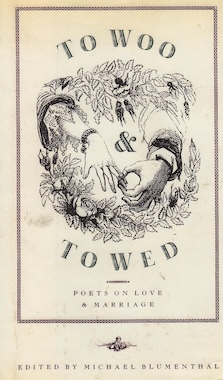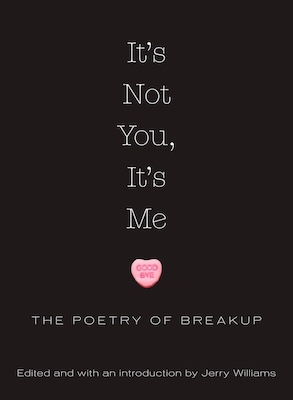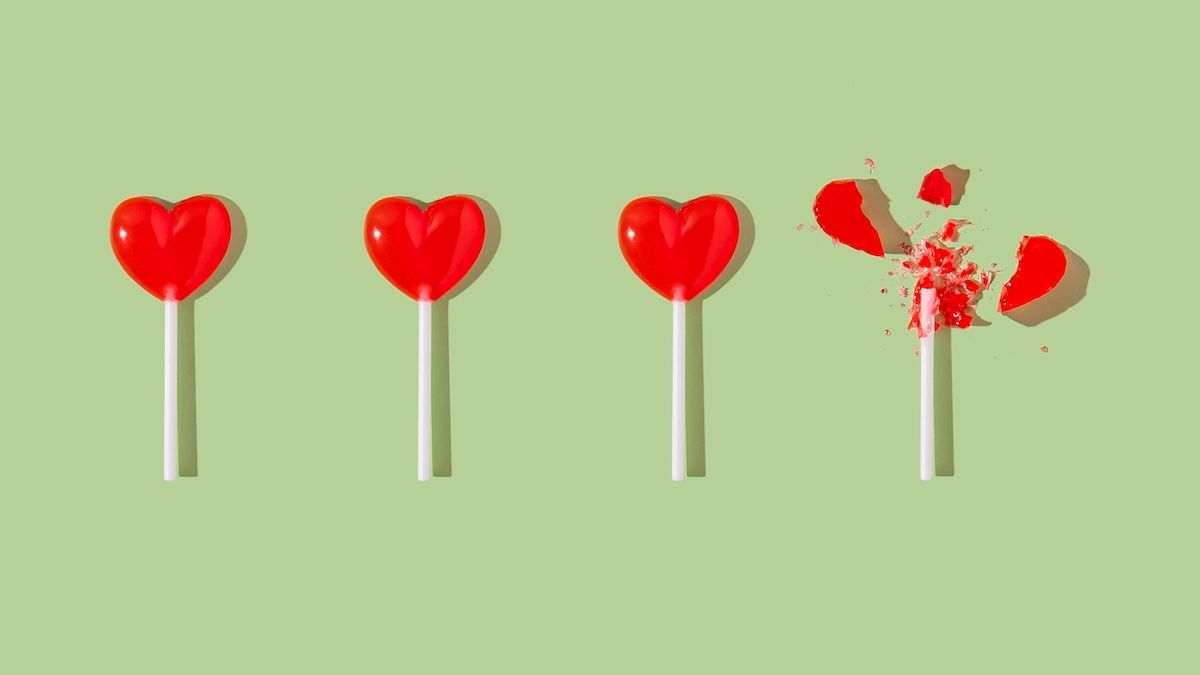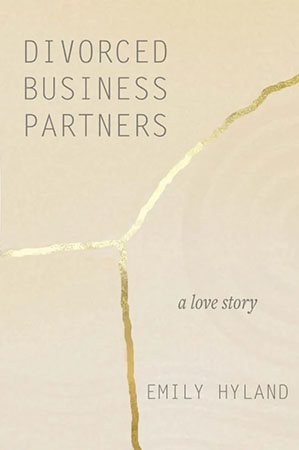Electric Literature Urgently Needs Your Help
For the 15,000 people who visit our site every day, reading Electric Literature costs nothing. And yet Electric Lit is not free. We need to raise $25,000 by December 31, 2024 to keep Electric Literature going into next year. If the continued existence of Electric Literature means something to you, please make a contribution today.

Heartbreak is a teacher, a moment that offers possibility for attunement—to pay attention with kindness and care—a chance to feel not just what we want, but what is here. As Stanley Kunitz writes in The Testing Tree,
“the heart breaks and breaks
and lives by breaking.
It is necessary to go
through dark and deeper dark
and not to turn.”
Attuning to heartbreak, staying with it in this way—not turning from it—has helped evolve my writing practice into a space to witness and tell about the astonishing texture of aliveness.
My poetry collection, Divorced Business Partners: A Love Story was born out of my divorce, when I wound up on a grief retreat deep in the heart of New Mexico. In the high desert, I learned the power of telling my story in order to begin to clear it from my somatic realm, to heal, to learn, and to move forward. What started all those years ago as angry villainizing from the vantage of a self-ascribed victim has evolved into a more hopeful, honest, reflection, more compassionate both to my ex and myself. The book, full of heartache, at its center, is a love story, with all the complexities innate to such a tale.
Building relationship with grief is a gift—that an aching heart is a portal into deeper intimacy with the wonder of being. As Francis Weller quotes Terry Tempest Williams in The Wild Edge of Sorrow, “Grief dares us to love once more.”
It’s my honor to share with you collections of poetry that feel like companions, written by poets who do the good work of meeting what arises—each touches the simple truths of life, death, and love—and all—through our sharing, as Ram Dass offers, “are just walking each other home” poem by poem.
Stag’s Leap by Sharon Olds
In Stag’s Leap, the speaker’s husband has left their long marriage, and she explores the situation through her keen perspective In Known to Be Left, Olds offers:
“…I am so ashamed
before my friends—to be known to be left
by the one who supposedly knew me best”
This collection is relatable in the way thatmuch of the learning and realizations happen for the speaker in the real time of her story unfolding. Old’s book is study in the craft of writing, but also the craft of living.
House of Light by Mary Oliver
Heartbreak is so much more than a broken heart, it’s also a breaking open to wonder. Oliver’s steady witnessing welcomes us into the depths of the world’s open-hearted wisdom, as in The Deer, where she writes,
“This is the earnest work. Each of us is given
only so many mornings to do it –
to look around and love
the oily fur of our lives.”
She distills concepts like awe and astonishment into salient moments for us to consider and also to remember the vast beauty of life beyond the hurt and pain that so often find their way to us.
Catalog of Unabashed Gratitude by Ross Gay
In this book, Ross Gay brings to life a heart that breaks in awe of the present moment. The opening poem, to the fig tree on 9th and christian, sets a tone of joyful optimism—a bunch of strangers inadvertently converge to eat figs under an old woman’s tree. Here, even though everyone is busy with the business and grief of their own lives, they stand together in community “gleefully eating out of each other’s hands…strangers maybe / never again.” Heartbreak needs to remember the possibilities of delight and joy, and Gay reminds us of such possibility in his remarkable work.
Atlantis by Mark Doty
I don’t know how to pick just one set of lines that conveys the overarching sense of vibrancy and appreciation for life in this vital collection wherein Doty writes through the heartbreak of losing his partner, Wally, to AIDS. Doty writes,
“…love, I know, it ends,
you don’t have to remind me,
though it seems a field
of endless jade.”
As he contemplates grief through his poems, heartbreak holds space for feeling into itself—not to wallow—but to feel it as true, as what is happening now, and to brighten into an amplified sense of appreciating the complexity and joy of this existence. I feel this sense of convergence hold so true in Two Ruined Boats. Doty writes,
“…myself, my lover,
twin points we thought fixed
coming all undone, though in a flaring spring sun
the world’s a single dazzled silver.”
The whole scope of Doty’s work—from this book to his newest memoir What is the Grass? Walt Whitman in My Life—is an ongoing meditation on what it means to be in this human incarnation.
What the Living Do by Marie Howe
On my bookcase, Doty’s Atlantis stands in kinship with Marie Howe’s What the Living Do, on the top shelf. Marie Howe is remarkable in her deft ability to develop emotional texture through simplicity. She brings us into the moment and offers it as it is. In A Certain Light, the speaker and her brother’s partner sit with her brother in hospice as he lapses in and out of wakefulness, and she narrates a scene of exquisite heartache:
“…a kind of paradise, he finally opened his eyes wide
and the room filled with a certain light we thought we’d never see again.
Look at you two, he said. And we did.
And Joe said, Look at you.
And John said, How do I look?
And Joe said, Handsome.”
Love pours from this moment, and the intimacy here between love and grief is real. We cannot meet love without knowing the pain that comes when we lose someone we love, and Howe takes us through this journey over and over again in her work.
Time is a Mother by Ocean Vuong
Ocean Vuong’s Time is a Mother offers another look at the experience of loss. Vuong meets grief as a son processing the death of his mother. His perception is sharpened by what has come to pass, and he shares what he witnesses with tenderness and candor. In Amazon History of a Former Nail Salon Worker, he chronicles the list of items ordered over the last year of his mother’s life. On this list, we move from the workings of life, with items like “Seafoam handheld mirror,” to “Chemo-Glam cotton headscarf, sunrise pink,” then onto “Eternity Aluminum Urn, Dove and Rose engraved, small.” The items mount with emotional weight quickly, expectedly—yet unexpectedly. Like the air fryer that showed up two days after my own mom died of breast cancer—Vuong allows the pain each object holds to speak for itself.

To Woo and to Wed edited by Michael Blumenthal
Beware, this anthology has some unhappy reviews online by folks expecting saccharine in a compilation of poems about partnership and marriage. Though, anyone in any long term relationship will appreciate that lack of sentimentality in exchange for the complex texture of truth:
“You must know that I do not love and that I love you,
because everything alive has its two sides;
a word is one wing of the silence,
fire has its cold half.
Heartache and love—complementary sides of the same center.”

It’s Not You, It’s Me: The Poetry of Breakup edited by Jerry Williams
Another more contemporary anthology, this group of poems encapsulates some common threads of the very specific type of heartbreak that comes when a relationship ends. Jerry Williams gathers a range of voices to offer solace and perspective for readers who need the company of other broken hearts in the midst of their own. In poems like, Divorced Fathers and Pizza Crusts, by Mark Halliday, we meet the divorced dad, on his night with his young son, sitting in the pizza shop, surrounded by a very metaphorical pile of crusts, while his kid plays with a friend. As we sit with and witness the speaker, we come to meet all his layers of heartbreak. It’s Not You; It’s Me is full of relatable, human moments to offer companionship for us all.
In whatever way you’re coming to know your broken heart, I hope you’re encouraged to dive into this selection, and in doing so, find solace and company with fellow open and aching hearts along the way.
Take a break from the news
We publish your favorite authors—even the ones you haven’t read yet. Get new fiction, essays, and poetry delivered to your inbox.
YOUR INBOX IS LIT
Enjoy strange, diverting work from The Commuter on Mondays, absorbing fiction from Recommended Reading on Wednesdays, and a roundup of our best work of the week on Fridays. Personalize your subscription preferences here.


